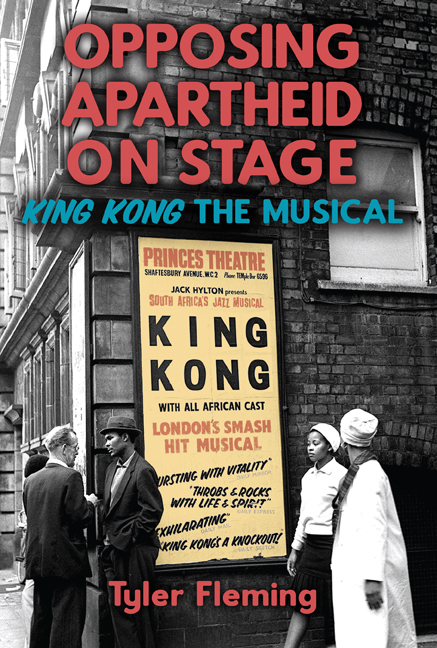Book contents
- Frontmatter
- Dedication
- Contents
- Acknowledgments
- Introduction
- 1 “Marvelous Muscles”: A History of Ezekiel Dlamini, the Real King Kong
- 2 Creating a “Back of the Moon”: The Union of Southern African Artists and Interracial Collaboration behind the “All-African” Musical
- 3 “Quickly in Love”: Popular Reception of the 1959 King Kong and Entertaining the Possibilities of a Different South Africa(s)
- 4 “Kwela Kong”: The Trials and Tribulations of a South African Musical Abroad in 1961
- 5 “Sad Times, Bad Times”: Issues of Exile, the King Kong Cast, and South African Jazz in Britain, 1961–1980
- 6 “The Boy's [and Girl’s] Doin’ It”: Moving to America and Rediscovering Africa, 1960–1989
- 7 “Death Song”: The 1979 Remake of King Kong and the Power of Cultural Memories under Apartheid
- Notes
- Bibliography
- Index
- Rochester Studies in African History and the Diaspora
2 - Creating a “Back of the Moon”: The Union of Southern African Artists and Interracial Collaboration behind the “All-African” Musical
Published online by Cambridge University Press: 06 October 2020
- Frontmatter
- Dedication
- Contents
- Acknowledgments
- Introduction
- 1 “Marvelous Muscles”: A History of Ezekiel Dlamini, the Real King Kong
- 2 Creating a “Back of the Moon”: The Union of Southern African Artists and Interracial Collaboration behind the “All-African” Musical
- 3 “Quickly in Love”: Popular Reception of the 1959 King Kong and Entertaining the Possibilities of a Different South Africa(s)
- 4 “Kwela Kong”: The Trials and Tribulations of a South African Musical Abroad in 1961
- 5 “Sad Times, Bad Times”: Issues of Exile, the King Kong Cast, and South African Jazz in Britain, 1961–1980
- 6 “The Boy's [and Girl’s] Doin’ It”: Moving to America and Rediscovering Africa, 1960–1989
- 7 “Death Song”: The 1979 Remake of King Kong and the Power of Cultural Memories under Apartheid
- Notes
- Bibliography
- Index
- Rochester Studies in African History and the Diaspora
Summary
For 1959 South Africa, the King Kong musical was groundbreaking. In an era in which black and white artistic circles operated independently, King Kong brought them together on a major theatrical production. Though there had been interracial efforts in local show business before, King Kong stood apart for its size, scale, ambition, and overall success. No play with black performers, music, or storyline ever became the universal hit that King Kong proved to be. As a result, King Kong became the standard bearer. It helped create the “township musical” format that was used in local theater for decades to come. Members of King Kong's cast and orchestra went on to become vital figures in local music, theater, and cinema. A handful like Miriam Makeba, Hugh Masekela, and Jonas Gwangwa even became stars overseas.
Beyond its interracial qualities and star-studded cast, King Kong’s inimitability also came from its popular reception. In a society as deeply divided as 1959 South Africa, this all-African musical became a cultural phenomenon. It took the country by storm and proved a bright spot in particularly tumultuous period of South African history. Because of its uniqueness, however, King Kong is often depicted as an “overnight” sensation that suddenly opened white society's eyes and ears to African performance and music. For a brief moment, predominantly white audiences packed theaters to watch Africans perform in a play that they were proud of that avoided negative stereotypes. In such a segregated society, white South Africans rarely considered the African populations’ talents and abilities. Suddenly, they took in a professional musical that looked, sounded, and felt different from anything ever staged before. It was polished and pulsed with a unique energy, image, and sound that whites were virtually ignorant of before King Kong. For Africans, King Kong's impact had a different “overnight” quality. With King Kong, whites were suddenly consuming black music, dance, singing, rhythms, and stories staged by Africans. It was not just a handful of liberals or radicals. King Kong was mainstream. Furthermore, this reception did not happen in secret, nor was it considered subversive. It happened out in the open. Multiracial audiences packed theaters across the country to see it, and stories about King Kong appeared in seemingly every newspaper. Looking back, the musical and its reception feel entirely out of step for the first decade of apartheid.
- Type
- Chapter
- Information
- Opposing Apartheid on StageKing Kong the Musical, pp. 49 - 85Publisher: Boydell & BrewerPrint publication year: 2020



